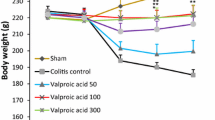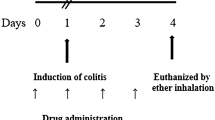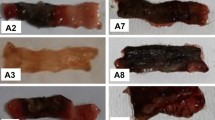Abstract.
Prostaglandin E1 (PGE1) is known to have a strong vasodilator effect and to block coagulation and inflammation in high concentrations. The aim of this study has been to investigate whether PGE1 has an inhibitory effect on inflammation in experimental colitis. Experimental colitis was produced by rectal instillation of 10% acetic acid in 60 rats. These were divided into prostaglandin (PG) (n = 30) and control groups (n = 30). Twelve hours later, an intraperitoneal injection of 2 µg PGE1 in 1 ml saline was given to the PG group and 1 ml saline to the control group. This was repeated daily and the animals were sacrified in groups of 10 on the 3rd, 7th and 10th day. Histopathological examination and hydroxyproline determination for assessment of collagen synthesis were performed. PGE1 significantly decreased inflammation on third day with the hydroxyproline level significantly higher in the PG group compared with the control group (p < 0.05). This difference was however not significant at the 7th and 10th day. The present study supports a beneficial role for prostaglandin E1 in reducing the severity of colonic inflammation following chemically induced colitis but only in the early stages of development.
Résumé.
La prostaglandine E1 (PGE1) est connue pour avoir une action vasodilatatrice importante et pour bloquer la coagulation et l'inflammation à haute concentration. Le but de cette étude est de déterminer si PGE1 a un effet inhibiteur sur l'inflammation dans la colite expérimentale. Une colite expérimentale a été produite par l'instillation rectale d'une solution à 10% d'acide acétique chez 60 rats. Ces derniers ont été divisés en deux groupes de 30 sujets: l'un recevant de la prostaglandine (PG) et l'autre servant de témoin. Douze heures après l'induction de la colite, une injection intrapéritonéale de 2 µg de PGE1 solution dans 1 ml de sérum a été administrée au groupe PG et 1 ml de sérum au goupe témoin. Cette injection a été répétée de manière quotidienne et les animaux ont été sacrifiés aux 3e, 7e et 10e jours. Des études histo-pathologiques et une détermination du taux d'hydroxyproline pour évaluer la synthèse du collagène ont été réalisées dans tous les cas. PGE1 diminue de manière significative l'inflammation au 3e jour et le taux d'hydroxypoline est nettement plus élevé que dans le groupe témoin (P < 0,05). Cette différence n'est toutefois pas significative au 7e ni au 10e jours. Cette étude souligne le rôle bénéfique de la prostaglandine E1 réduisant la sévérité d'une inflammation colique secondaire à une colite chimique expérimentale; cet apport n'est toutefois visible que dans les premiers jours de l'inflamma-tion.
Similar content being viewed by others
Author information
Authors and Affiliations
Additional information
Accepted: 16 December 1996
Rights and permissions
About this article
Cite this article
Terzioğlu, T., Yaltι, T. & Tezelman, S. The effect of prostaglandin E1 on experimental colitis in the rat. Int J Colorect Dis 12, 63–66 (1997). https://doi.org/10.1007/s003840050082
Issue Date:
DOI: https://doi.org/10.1007/s003840050082




